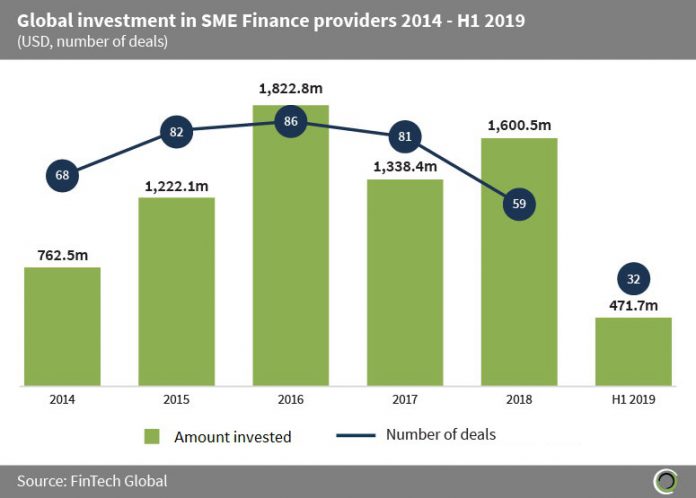SME Finance is a subcategory of Marketplace Lending with companies in this subcategory capturing almost 30% of deals in this subsector of FinTech between 2014 and H1 2019.
More than $7.2bn was Invested in SME lenders between 2014 and H1 2019 across 408 deals, with funding more than doubling from $762.5m in 2014 to over $1.6bn last year
SME lending has experienced significant growth since 2009, as banks retreat from the space due to tighter regulations around lending standards and capital adequacy ratios. The regulatory environment, quantitative easing and the monetary policy adopted by central bankers over the past decade has been particularly problematic for small business lending.
Funding peaked at over $1.8bn in 2016, mainly driven by the $1bn funding that Beijing-based JD Digits (formerly JD Finance) raised in Q1, led by Sequoia Capital China, valuing the company at $7.1bn.
The risk weighted regime of Basel III induces banks to favour mortgage lending over loans to SMEs, and the artificially low bond yields caused by QE encourages substitution away from bank lending to bond issuances. This dynamic has led to growth in the number of alternative lenders providing financing solutions to SMEs such as invoice and trade finance, asset based loans and unsecured cashflow loan facilities.
Investment reached almost $0.5bn in the first six months of the year with almost a fifth of the deals during the period valued above $20m. TradePlus24, a Swiss receivables finance provider based in Zurich raised $120m in February from SIX Fintech Ventures, Berliner Volksbank Ventures and Credit Suisse, which was the largest SME Finance deal of H1 2019.
The data for this research was taken from the FinTech Global database. More in-depth data and analytics on investments and companies across all FinTech sectors and regions around the world are available to subscribers of FinTech Global. ©2019 FinTech Global















